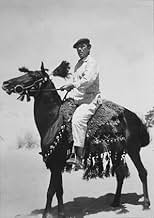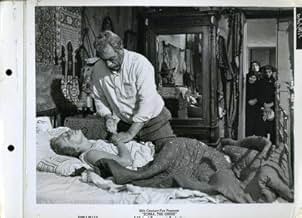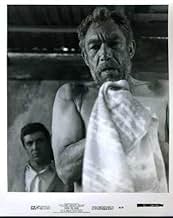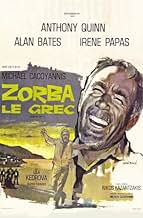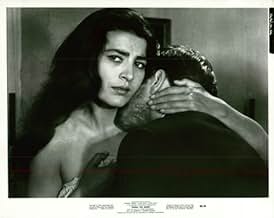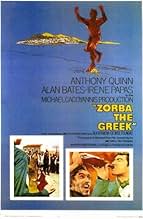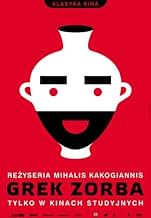AVALIAÇÃO DA IMDb
7,6/10
25 mil
SUA AVALIAÇÃO
Um escritor inglês que viaja a Creta por negócios encontra sua vida mudada para sempre quando conhece o sociável Alexis Zorba.Um escritor inglês que viaja a Creta por negócios encontra sua vida mudada para sempre quando conhece o sociável Alexis Zorba.Um escritor inglês que viaja a Creta por negócios encontra sua vida mudada para sempre quando conhece o sociável Alexis Zorba.
- Direção
- Roteiristas
- Artistas
- Ganhou 3 Oscars
- 8 vitórias e 16 indicações no total
Giorgos Foundas
- Mavrandoni
- (as George Foundas)
Yorgo Voyagis
- Pavlo
- (as George Voyadjis)
George P. Cosmatos
- Acne Faced Boy
- (não creditado)
Nikos Papadakis
- Extra
- (não creditado)
- Direção
- Roteiristas
- Elenco e equipe completos
- Produção, bilheteria e muito mais no IMDbPro
Avaliações em destaque
When I first saw Zorba the Greek 4 years ago, I inwardly thanked my philosophy teacher for having us watch this masterpiece. Today, I am still greatful to him. This movie is definetely one of my all time favorite. The whole cast is great, the story is really close from the book (except for some details that an author can write in a book, but a director can't put easily in a film), images are wonderful, Crete is.perfect. If you have never seen this movie, I recommend it to you.
Anthony Quinn's Zorba became a point of reference, in fact I'm writing this review 54 years after its first release. He is everything and more. Alan Bates is outstanding walking that very thin line but totally committed to that duality that makes him so human, so real. Lila Kedrova won an Oscar for her performance, deservedly so. Simone Signoret had been offered the part and she was the one who suggested Lila Kedrova to the director, Michael Cacoyanis. I love that story. Zorba has also the power of Irene Papas who makes her silent calling absolutely riveting and the contagious Mikis Theodorakis's score all together in a beautiful, savage, compelling film that doesn't show any signs of aging
Nikos Kazantzakis' novels lend themselves to cinematic treatment. Jules Dassin made a great adaptation of "He Who Must Die", and Michael Cacoyannis was equally successful in bringing "Alexis Zorbas" to the screen. Watching this film for a second time puts into perspective a lot of things that escape many a viewer the first time around.
Michael Cacoyannis changed the order of events in the book, as well as Nikos, who he transforms into Basil, the Englishman. The changes are not without merit since all the elements contribute to blend well together in the finished product. The director was fortunate to find such collaborators as Mikis Theodorakis, the genial composer of the music score and Walter Lassally, who photographed the barren area where most of the action takes place. Viewing the film on cable recently, shows Lassally's crisp black and white photography in mint condition.
The film is totally dominated by Zorba, who is a figure larger than life, as he takes Basil under his wing from the start. Anthony Quinn was a perfect choice for playing the title character. Mr. Quinn had worked with other brilliant directors, Federico Fellini, being one of them. It's almost impossible to think of Mr. Quinn as being an American because the magnificent transformation he undergoes here to portray Zorba.
Alan Bates, who is seen as Basil, the Englishman of Greek descent, who is going to Crete to see the family's land and mine. By underplaying Basil, Mr. Bates set the right tone, in sharp contrast with Anthony Quinn's exuberance. Alan Bates, in the end, made perfect sense with the way he played Basil.
Lila Kedrova is another surprise in the film. She is the tragic Madame Hortense, who has lived in the island for quite a while. It's ironic that love always eluded her until she finds in Zorba a reason for keep on living. Irene Papas is equally intense as the widow who is haunted by all the men in town. She has little to say, but just a look from her smolders the screen, be it, for the lust she felt for Basil, or the hatred for the town male population.
Michael Cacoyannis uses these men, as a sort of Greek Chorus, so important in Greek tragedies. The same could be said of the older women of the town who resent the arrivals of strangers. The Greek cast one sees is quite effective in the context of the movie.
"Alexis Zorbas", or "Zorba, the Greek", is a film that will stay with the viewer for quite a while because of what the director accomplished with it.
Michael Cacoyannis changed the order of events in the book, as well as Nikos, who he transforms into Basil, the Englishman. The changes are not without merit since all the elements contribute to blend well together in the finished product. The director was fortunate to find such collaborators as Mikis Theodorakis, the genial composer of the music score and Walter Lassally, who photographed the barren area where most of the action takes place. Viewing the film on cable recently, shows Lassally's crisp black and white photography in mint condition.
The film is totally dominated by Zorba, who is a figure larger than life, as he takes Basil under his wing from the start. Anthony Quinn was a perfect choice for playing the title character. Mr. Quinn had worked with other brilliant directors, Federico Fellini, being one of them. It's almost impossible to think of Mr. Quinn as being an American because the magnificent transformation he undergoes here to portray Zorba.
Alan Bates, who is seen as Basil, the Englishman of Greek descent, who is going to Crete to see the family's land and mine. By underplaying Basil, Mr. Bates set the right tone, in sharp contrast with Anthony Quinn's exuberance. Alan Bates, in the end, made perfect sense with the way he played Basil.
Lila Kedrova is another surprise in the film. She is the tragic Madame Hortense, who has lived in the island for quite a while. It's ironic that love always eluded her until she finds in Zorba a reason for keep on living. Irene Papas is equally intense as the widow who is haunted by all the men in town. She has little to say, but just a look from her smolders the screen, be it, for the lust she felt for Basil, or the hatred for the town male population.
Michael Cacoyannis uses these men, as a sort of Greek Chorus, so important in Greek tragedies. The same could be said of the older women of the town who resent the arrivals of strangers. The Greek cast one sees is quite effective in the context of the movie.
"Alexis Zorbas", or "Zorba, the Greek", is a film that will stay with the viewer for quite a while because of what the director accomplished with it.
What an exuberant film - not to be missed! It chronicles sadness and joy so beautifully that one can't help but want to weep, laugh, and dance along. There are four wonderful performances, led by Anthony Quinn, whose enthusiam for life almost leaps from the screen, giving rise to an almost sacrilegious thought: How could Rex Harrison's stuffy, embalmed Professor Henry Higgins have won the Best Actor Oscar over Quinn as Zorba? Lila Kedrova is heartbreaking as Madame Hortense, the dying prostitute with a colorful past. The always-enjoyable Alan Bates, and the striking Irene Papas as the Widow. Like Anna Magnani, Papas was an actress who transcended any language barrier, who didn't need dialogue at all - her face and body said everything she needed to.
For the most part the film looks great on DVD, with crisp, clear black-and-white photography. But I have one quibble: the transfer seems to have been made from the same source as the videotape prints in circulation, because there are a couple of instances of obvious post-production looping (possibly for prime-time television broadcasts), changing 'goddam' to 'old damn,' for instance - they even do this in the English subtitles. But read Quinn's lips - there's no mistaking what the original lines were! I'd expected that the original unedited soundtrack would have been restored.
For the most part the film looks great on DVD, with crisp, clear black-and-white photography. But I have one quibble: the transfer seems to have been made from the same source as the videotape prints in circulation, because there are a couple of instances of obvious post-production looping (possibly for prime-time television broadcasts), changing 'goddam' to 'old damn,' for instance - they even do this in the English subtitles. But read Quinn's lips - there's no mistaking what the original lines were! I'd expected that the original unedited soundtrack would have been restored.
A young Englishman is writing on a manuscript about the Buddha. He meets Alexis Zorba who greatly influences his outlook on life. The narrator, whose name is not revealed, hires Zorba to superintend the workmen in his lignite mine in Crete. Zorba the Greek is a book and a movie by nature on the contrast between the Apollonian and the Dionysian outlook on life. Apollo/the boss(Alan Bates) represents the spirit of order and rationality, while Dionysus/Zorba(Anthony Quinn) represents the spirit of ecstatic, spontaneous will to life. Anthony Quinn's performance is really great. I read the book about a month ago and I guess I couldn't visualize the Zorba image in my mind that well. His looks,one-liners,his dancing sirtaki on the beach,his harmony with Madame Hortense(Lila Kedrova)just looks so nice.It is really surprising that Lila Kedrova got "Academy Award for Best Supporting Actress" while Anthony Quinn just got the nomination for best actor in a leading role.(Such a pity that he didn't get it.) Well that work of art is not so great as "Jesus Re-crucified" or "The Last Temptation of Christ " but is a still great Kazanthakis art.And the adapted movie is a really good one coz given that the whole book is based on a contrast introduced by Friedrich Nietzsche and it is not supposed to be easy to cinematize a philosophical book.Great Quinn! Great movie!(But I Don't THINK LILA KEDROVA DESERVES THAT AWARD) If you have ever read Kazanthakis you should absolutely see this movie!
Você sabia?
- CuriosidadesAnthony Quinn (Alexis Zorba) had a broken foot during filming, and thus couldn't perform the dance on the beach as scripted, which called for much leaping around. The dance is called "syrtaki", and contains elements from various traditional Greek dances. It was created especially for this movie.
- Erros de gravaçãoNear the end of the movie, when the log is coming down the hill it is seen as fairly round and the bark is rough and peeling, like a natural log. But when the log gets to the end of the cable, it appears to be a fake log with no bark and a visible framework that makes it look multi-sided rather than round.
- Citações
Basil: I don't want any trouble.
Alexis Zorba: Life is trouble. Only death is not. To be alive is to undo your belt and *look* for trouble.
- ConexõesFeatured in V.I.P.-Schaukel: Episode #3.2 (1973)
- Trilhas sonorasRiri Ririka
from the operetta "Our Ririka" (1929) (uncredited)
Written by Stathis Mastoras
Performed by Madame Hortense (Lila Kedrova)
Principais escolhas
Faça login para avaliar e ver a lista de recomendações personalizadas
- How long is Zorba the Greek?Fornecido pela Alexa
Detalhes
Bilheteria
- Orçamento
- US$ 783.000 (estimativa)
- Faturamento bruto mundial
- US$ 1.358
- Tempo de duração
- 2 h 22 min(142 min)
- Cor
- Mixagem de som
- Proporção
- 1.66 : 1
Contribua para esta página
Sugerir uma alteração ou adicionar conteúdo ausente



